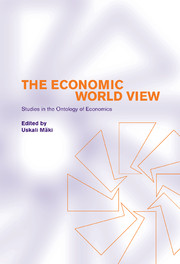Book contents
- Frontmatter
- Contents
- Notes on the contributors
- Preface
- I The what, why, and how of economic ontology
- 1 Economic ontology: what? why? how?
- 2 The empirical presuppositions of metaphysical explanations in economics
- 3 Quality and quantity in economics: the metaphysical construction of the economic realm
- II Rationality and homo economicus
- Part III Micro, macro, and markets
- Part IV The world of economic causes
- Part V Methodological implications of economic ontology
- Name index
- Subject index
2 - The empirical presuppositions of metaphysical explanations in economics
Published online by Cambridge University Press: 04 August 2010
- Frontmatter
- Contents
- Notes on the contributors
- Preface
- I The what, why, and how of economic ontology
- 1 Economic ontology: what? why? how?
- 2 The empirical presuppositions of metaphysical explanations in economics
- 3 Quality and quantity in economics: the metaphysical construction of the economic realm
- II Rationality and homo economicus
- Part III Micro, macro, and markets
- Part IV The world of economic causes
- Part V Methodological implications of economic ontology
- Name index
- Subject index
Summary
Metaphysical explanations and analyses are common fare among commentators on economics. Philosophers, economists and historians of economic thought often evaluate, criticize, support or explain the practice of economics by invoking very general metaphysical facts. In what follows I raise some skeptical questions about this practice on two interrelated grounds. First and foremost I argue that analyses of economics on allegedly general metaphysical grounds often rest on much more substantive, empirical and contingent matters of fact – on substantive issues in economics itself – than their advocates acknowledge. Second, defending or criticizing economics on general metaphysical grounds tends to ignore the complexity of economic research. Economists employ theories for different purposes in different contexts with different interpretations. Metaphysical diagnoses of success or failure generally must ignore this diversity and instead wrongly treat modern economics as a homogeneous whole. The moral I draw from these two points is not that metaphysical considerations play no role, but that to understand their role we must pay much more attention to empirical, local details of economic explanation.
I support these claims by looking at three cases where economics has been evaluated by appeal to broad metaphysical considerations. Section I below looks at a common argument among philosophers that goes like this: Modern economics is a more or less dismal failure by the standards of the natural sciences. Why is that? Neo-classical theory is essentially committed to certain predicates or kinds. The best explanation for the failure of neo-classical theory is that those essential predicates or kinds do not cut nature at the joints – in short, they are not natural kinds.
- Type
- Chapter
- Information
- The Economic World ViewStudies in the Ontology of Economics, pp. 15 - 31Publisher: Cambridge University PressPrint publication year: 2001



